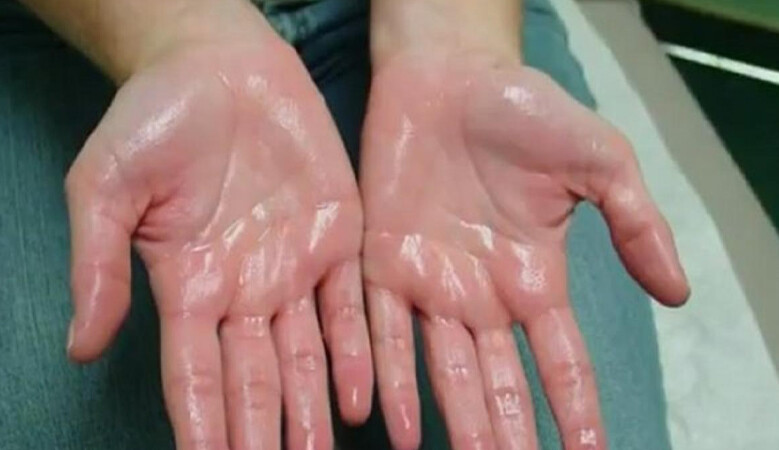Some people’s sweat glands are unduly excessively active and for unknown reasons, they produce continuous and large amounts of sweat. This phenomenon is abnormal sweating or excessive sweating (medical: hyperhidrosis), which affects around 5% of the world’s population.
Symptoms of excessive sweating
Sweating is a “normal” and necessary function which is of great importance in the regulation of body temperature. There are millions of sweat-producing glands in your body. Warm weather, exercise, stress, infectious diseases, and consuming strong-flavoured (e.g. hot and highly spiced) foods activate your sweat glands and increase sweat production (sweating).
The most accepted view is that abnormal sweating is a consequence of the hyperactivity of the sympathetic nervous system, which causes the sweat glands to continuously produce sweat. Patients with excessive sweating sweat 4-5 times more than average. The amount of sweat significantly exceeds what the body needs to maintain and control the body temperature.
In essence, the sweat glands of people with excessive sweating are always “switched ON”, and do not require a trigger to activate them, such as a rise in body temperature while exercising.

Forms of excessive sweating
Primary hyperhidrosis is most often a hereditary disease, i.e., it shows family accumulation. According to research findings, it is related to excessive activity of the sympathetic nervous system. The nerves running to the sweat glands are malfunctioning, sending signals to the sweat glands to secrete excessive amounts of sweat, even if there is no reason to do so. Even at rest and in cool weather, the sweating is so strong that a “healthy-ish” person can only experience it in the heat of the sauna.
Primary excessive sweating usually appears as early as childhood. In most cases, sweating is strongest in a defined area of the body, such as the palms, soles, and armpits, and less often the head, face, and neck. Rarely, several areas can be affected at the same time.
Although excessive sweating is not a life-threatening condition, it can also have a serious impact on everyday life, learning, work, and relationships. The problem can lead to mental problems, depression, and isolation.
Secondary excessive sweating can also be caused by a disease or a side effect of a medicine. However, this usually affects the whole body. In such a case, identifying and eliminating the root cause(s) is the method of treatment.
Relieving Symptoms
Currently, there is no cure that would permanently eliminate hyperhidrosis or excessive sweating phenomenon. However, there are a number of treatments available to relieve the symptoms.
The treatment is safe, needle-free and drug-free. A mild, pulsating electric current is passed through the skin of the problem area. Treatment with a current of appropriate frequency and intensity “separates” the connection between the sweat glands and the vegetative nerves that provide them with incorrect instructions. This eliminates sweating generated by malfunctioning neural activity. A two-week cure eliminates sweating for weeks, or at least significantly reduces it. What is important: it is almost always successful!
Find a guide on how to do the treatment here.
Tap water iontophoresis device(s) that can help alleviate the symptoms:
[message title=”DermaDry Total iontophoresis device” title_color=”#ffffff” title_bg=”#1e73be” title_icon=”” content_color=”#000000″ content_bg=”#ededed” id=””]
- this device was developed as an effective way to treat abnormal sweating

- separate programmes are available to treat sweating in the palms, soles (hands and feet sweating, i.e., palmoplantar hyperhidrosis) and armpits/underarms (underarm sweating, that is, axillary hyperhidrosis).
- simple operation, 15-30 minutes treatment time per day
- after 2 weeks of treatment, 93% success rate, sweating normalizes or disappears completely
- for home use, cosmetologists, or dermatology clinics
[/message]

